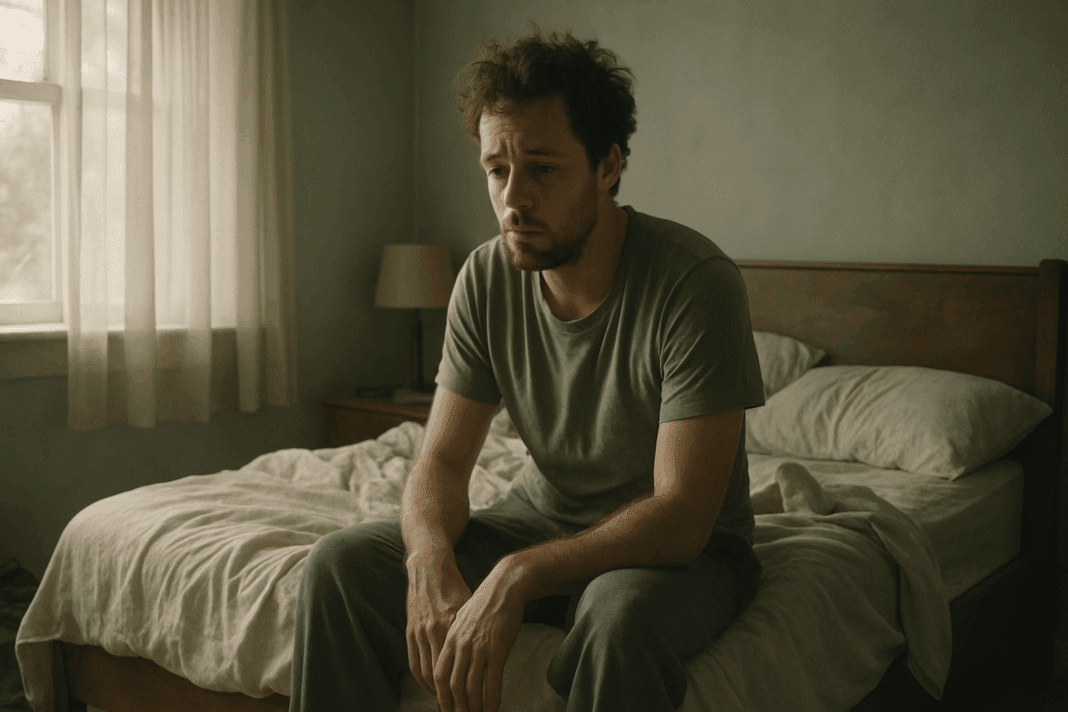Waking up after a full night of sleep should leave you feeling refreshed and ready to take on the day. But for many individuals, that isn’t the case. The question arises, why am I still tired after sleeping, even when you’ve had the recommended seven to nine hours of rest? This experience is far from rare, and it points to a deeper set of physiological, psychological, and lifestyle-related issues that often go unnoticed. Persistent fatigue, especially after what should be restorative sleep, can be a sign of underlying health conditions, misaligned circadian rhythms, or even lifestyle mismanagement. In this article, we explore the critical medical, behavioral, and environmental factors that could be sabotaging your energy levels, offering insights to help you understand and address this frustrating phenomenon.
You may also like: Essential Tips on How to Take Deep Sleep and Fight Everyday Fatigue
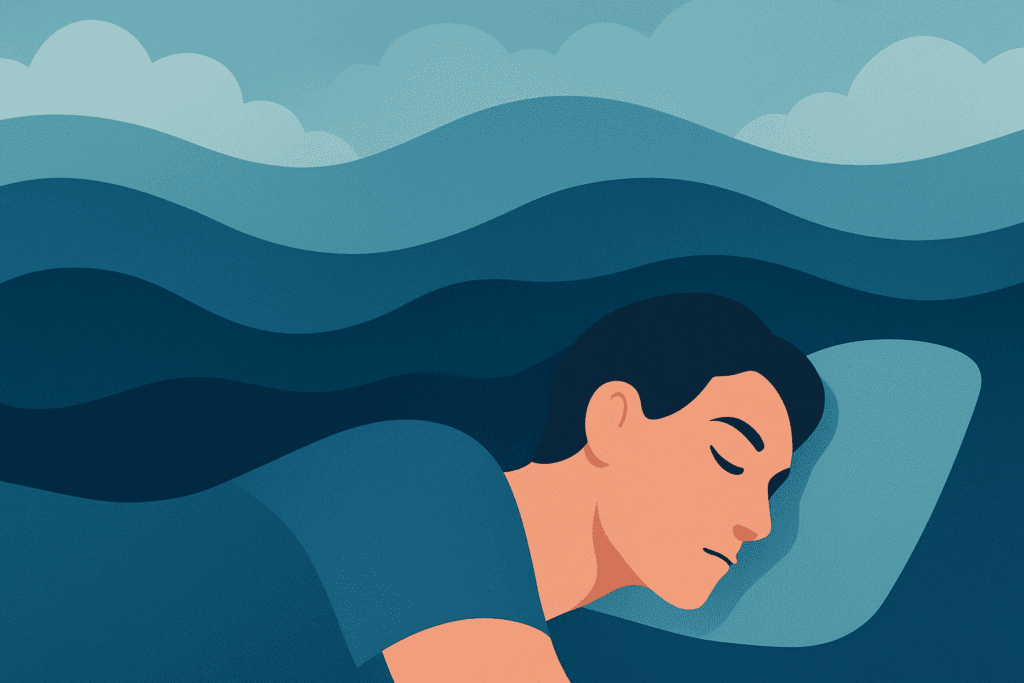
Understanding Sleep Architecture: More Than Just Hours in Bed
To begin unraveling the mystery of why people wake up feeling tired, it’s essential to understand that sleep is not a uniform state. Instead, it’s composed of distinct stages, including light sleep, deep sleep, and REM (Rapid Eye Movement) sleep. Each stage plays a specific role in physical repair, memory consolidation, emotional regulation, and energy restoration. Simply sleeping for eight hours does not guarantee that these restorative phases have occurred in the correct proportions. Individuals who report being still tired after 8 hours of sleep may be spending insufficient time in the deeper, more restorative stages due to frequent awakenings, stress, sleep disorders, or environmental disruptions.
Sleep disorders such as obstructive sleep apnea (OSA), restless legs syndrome (RLS), and insomnia can dramatically interfere with the progression through sleep stages. Even if you’re unaware of frequent arousals during the night, they can prevent your body from reaching or sustaining deep sleep and REM sleep. This could explain why some people consistently wake up feeling tired, despite maintaining what appears to be a healthy sleep schedule.
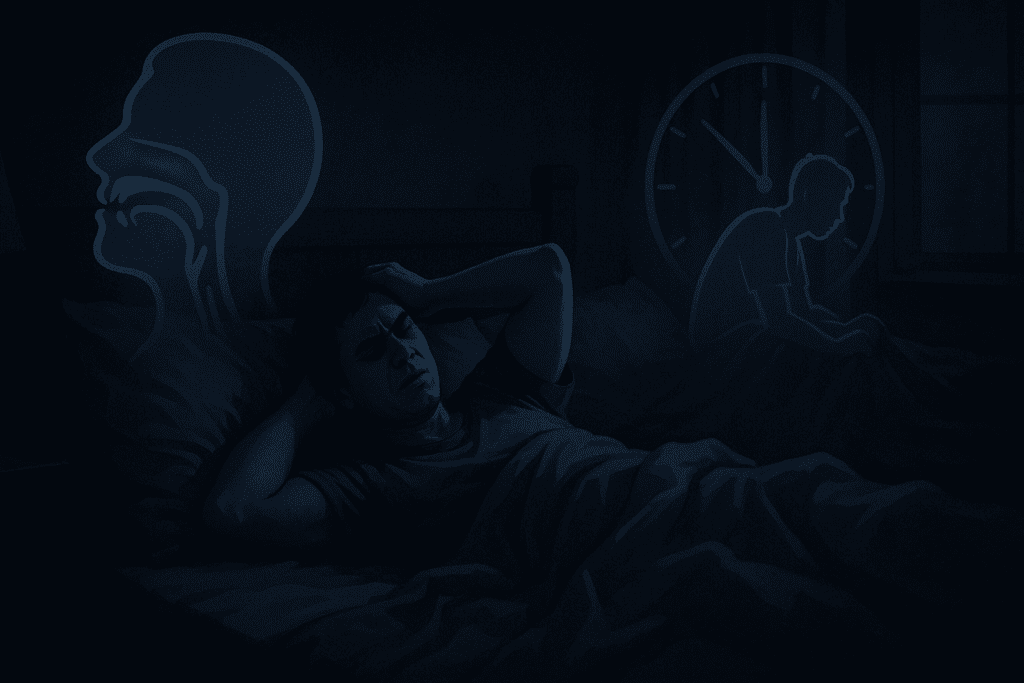
Why Am I Still Tired After Sleeping: The Role of Sleep Disorders
One of the most common and underdiagnosed causes of morning fatigue is sleep apnea, a condition characterized by repeated interruptions in breathing during sleep. These interruptions can last from a few seconds to over a minute and may occur hundreds of times per night. Each pause disrupts the natural progression through sleep cycles, often pushing the brain out of deep or REM sleep into a lighter stage or full wakefulness. Despite no conscious memory of these awakenings, the body does not experience the complete rest it requires. As a result, sufferers may wake up feeling tired every morning, regardless of how long they slept.
Another hidden culprit behind morning fatigue is insomnia. Often misunderstood as simply the inability to fall asleep, insomnia also includes difficulty staying asleep or waking up too early without being able to fall back asleep. These disruptions can significantly impair sleep quality and duration, leading to waking up fatigued even after spending many hours in bed. Chronic insomnia is frequently linked to anxiety, depression, and stress—factors that compound fatigue and exacerbate the perception of tiredness.
Restless legs syndrome is another lesser-known but impactful condition. Characterized by uncomfortable sensations in the legs and an uncontrollable urge to move them, RLS often disrupts sleep without the individual’s awareness. People with RLS may toss and turn throughout the night, failing to attain the sustained stillness required for deep sleep, thereby perpetuating the question, why do I wake up tired, day after day.
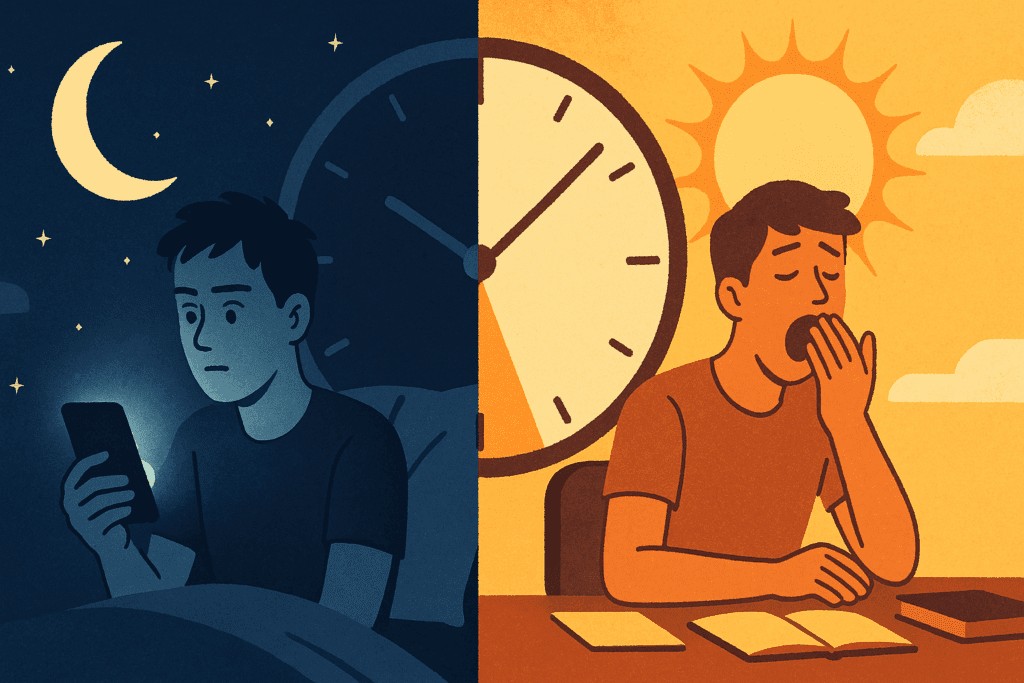
Circadian Rhythm Disruptions and Their Impact on Fatigue
Circadian rhythms govern the body’s internal clock, influencing sleep-wake cycles, hormone production, and metabolic processes. When this natural rhythm is disrupted—due to jet lag, shift work, irregular bedtimes, or excessive screen exposure before sleep—sleep becomes fragmented and less restorative. Even if the total sleep time appears adequate, misalignment with the body’s natural circadian phase can lead to waking up tired and groggy.
For example, individuals who are “night owls” may struggle with social jet lag if their work or school requires early rising. In such cases, they may fall asleep late due to their biological predisposition and be forced to wake up before completing their sleep cycles. This mismatch causes chronic sleep debt and contributes to the persistent feeling of being still tired after 8 hours of sleep, especially if those hours are not aligned with the body’s optimal sleep window.
The artificial lighting of modern life further complicates circadian regulation. Blue light emitted from phones, tablets, and computers suppresses melatonin, the hormone responsible for sleep onset. This delay in melatonin production shifts the circadian phase later, creating difficulties in falling asleep on time and shortening sleep duration. Consequently, many people wake up feeling tired without recognizing the environmental sources of their fatigue.
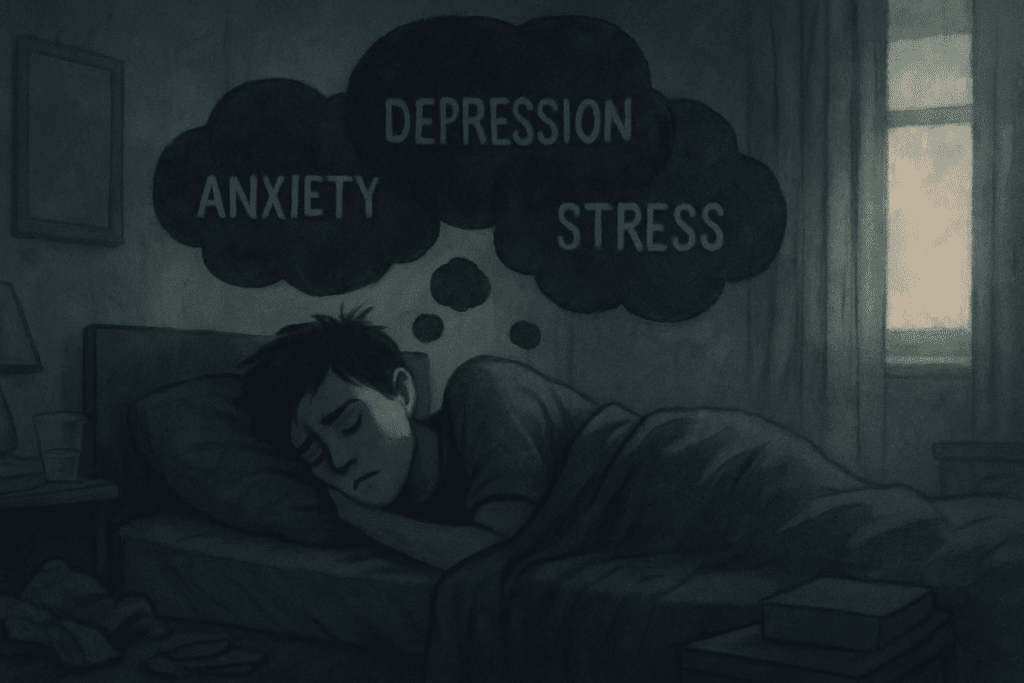
Psychological and Emotional Factors: The Hidden Energy Drains
While physical sleep disturbances are a common cause of fatigue, psychological and emotional health play an equally critical role. Mental health conditions such as depression, anxiety, and chronic stress can drastically alter sleep quality and contribute to feelings of exhaustion. Depression, for instance, is often accompanied by hypersomnia (excessive sleep) or insomnia. Even when adequate sleep duration is achieved, individuals with depression frequently report feeling drained and waking up fatigued due to the disorder’s impact on neurochemical regulation and energy metabolism.
Anxiety disrupts sleep by activating the sympathetic nervous system, also known as the fight-or-flight response. This hyperarousal makes it difficult to fall asleep and maintain deep sleep. As a result, anxious individuals may experience light, fragmented sleep that leaves them waking up tired, despite spending many hours in bed. Chronic stress exacerbates this cycle by increasing cortisol levels, which interfere with melatonin production and sleep depth.
Moreover, emotional labor—the mental effort required to manage and suppress emotions throughout the day—is an underappreciated contributor to fatigue. Over time, this constant internal regulation can deplete energy reserves, leaving individuals mentally and physically exhausted, even when their sleep duration appears adequate. Understanding these psychological dimensions is crucial for addressing the deeper question of why am I still tired after sleeping.
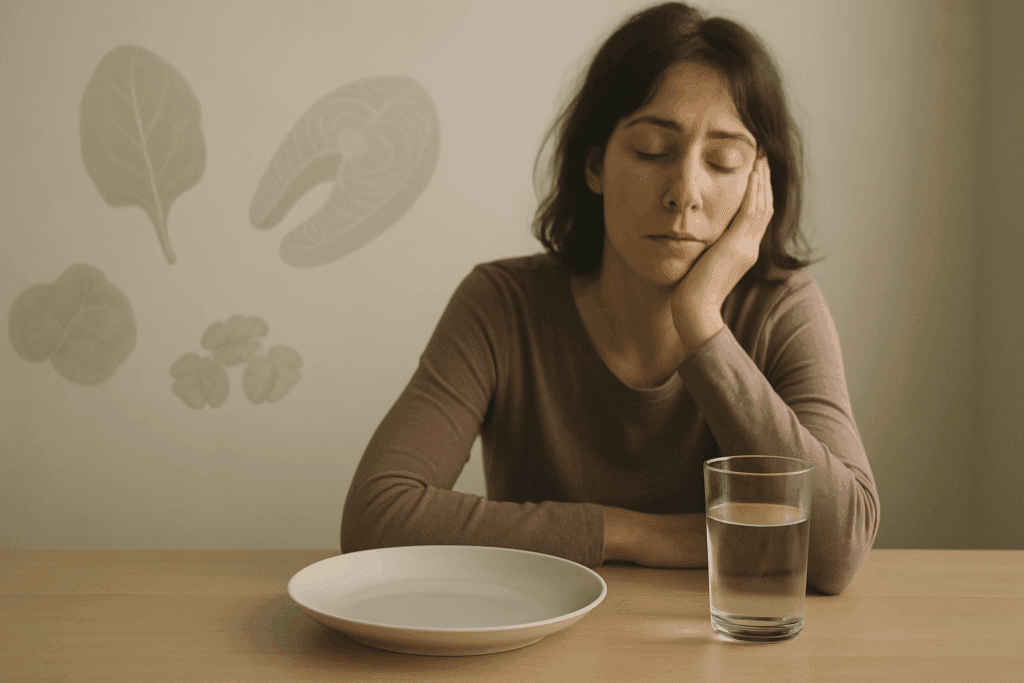
Nutritional Deficiencies That Sap Energy Despite Sleep
Sleep quality is deeply interconnected with nutrition, and deficiencies in key nutrients can impair the body’s ability to restore energy overnight. Iron deficiency, for example, can lead to anemia, a condition that reduces oxygen delivery to tissues and organs. Individuals with iron-deficiency anemia may wake up feeling tired because their bodies struggle to maintain energy production even during rest.
Vitamin D plays a critical role in sleep regulation and immune function. Low levels of vitamin D have been associated with shorter sleep duration and lower sleep efficiency, contributing to persistent fatigue. Similarly, deficiencies in B vitamins, particularly B6, B12, and folate, can disrupt neurotransmitter synthesis, affecting mood and sleep quality. These deficiencies can result in poor energy metabolism, making individuals feel waking up fatigued even after seemingly sufficient rest.
Magnesium is another essential mineral involved in over 300 biochemical reactions in the body, including those that regulate the nervous system and promote muscle relaxation. A lack of magnesium can lead to insomnia, restless sleep, and muscle cramps that interrupt sleep continuity. Recognizing and correcting these deficiencies through dietary adjustments or supplementation may help resolve the persistent question, why do I wake up tired, despite ample time spent sleeping.
Lifestyle Choices That Undermine Restorative Sleep
Daily habits profoundly affect how the body prepares for and recovers from sleep. Caffeine and alcohol, while commonly used, can interfere with sleep architecture. Caffeine blocks adenosine, the sleep-inducing neurotransmitter, and can remain in the bloodstream for several hours, making it harder to fall and stay asleep. Alcohol, though initially sedating, disrupts REM sleep and leads to fragmented rest, which may result in waking up tired and unfocused.
Irregular sleep schedules, particularly on weekends, can induce social jet lag—a condition where the body’s internal clock becomes desynchronized from actual sleep times. This inconsistency reduces sleep quality and leaves many people still tired after 8 hours of sleep when they attempt to return to a regular schedule. Napping late in the day, eating heavy meals before bed, or engaging in stimulating activities close to bedtime can all further degrade sleep quality.
Physical inactivity is another often-overlooked factor. Regular exercise improves sleep depth and duration by promoting natural fatigue and reducing anxiety. However, overly intense or poorly timed workouts can have the opposite effect. Finding a balanced, consistent routine that supports rather than hinders sleep can be a powerful intervention for those constantly asking, why am I still tired after sleeping.
Hidden Medical Conditions Behind Persistent Fatigue
In some cases, unexplained morning fatigue may be a symptom of a broader medical issue. Thyroid disorders, particularly hypothyroidism, slow down metabolism and reduce overall energy availability. Individuals with this condition often wake up feeling tired, experience weight gain, and have difficulty concentrating. Blood tests for thyroid hormones (TSH, T3, and T4) can help diagnose this often-overlooked cause.
Chronic fatigue syndrome (CFS), also known as myalgic encephalomyelitis, is characterized by profound, unexplained fatigue lasting longer than six months and not significantly relieved by rest. This condition is often misunderstood and misdiagnosed, but it severely impairs daily functioning. People with CFS frequently report waking up fatigued even after long periods of sleep, reflecting a fundamental disruption in energy metabolism.
Other conditions such as fibromyalgia, diabetes, and autoimmune disorders can also contribute to chronic tiredness. These illnesses often produce systemic inflammation, hormonal imbalances, and pain, all of which interfere with sleep and energy recovery. Investigating these underlying health issues with the help of a medical professional is crucial for anyone continually wondering, why do I wake up tired, despite practicing good sleep hygiene.
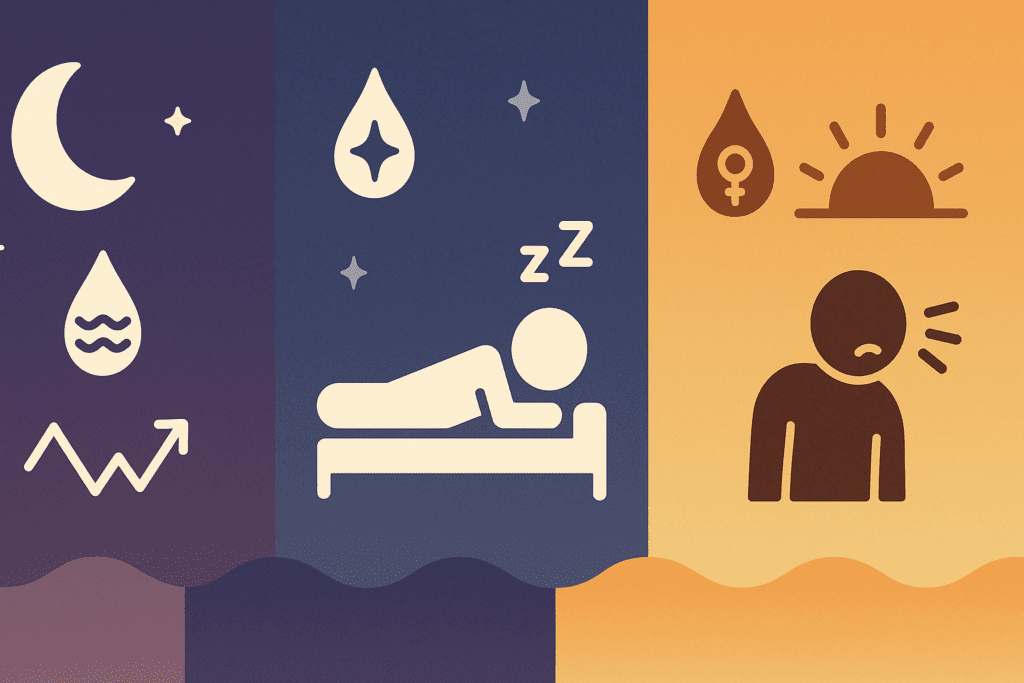
Hormonal Imbalances and Their Effects on Sleep Restoration
Hormones are vital regulators of sleep and energy, and imbalances in these chemical messengers can significantly affect how rested you feel in the morning. Cortisol, commonly known as the stress hormone, follows a diurnal pattern, peaking in the early morning to promote wakefulness. If cortisol levels are either too high or too low at the wrong time, it can disrupt sleep patterns and cause waking up tired or wired.
Melatonin, the sleep hormone, signals to the body that it’s time to wind down. Low melatonin levels can delay sleep onset and reduce total sleep time, especially in individuals exposed to artificial light at night. Meanwhile, imbalances in estrogen and progesterone, particularly during menstruation, pregnancy, or menopause, can also lead to sleep disturbances and morning fatigue.
Growth hormone, secreted primarily during deep sleep, supports tissue repair and energy restoration. A lack of deep sleep due to stress, poor sleep habits, or sleep apnea can reduce growth hormone release and impair recovery. Addressing these hormonal dynamics may provide relief for individuals who remain still tired after 8 hours of sleep, helping them reclaim the restorative power of sleep.
Why Am I Still Tired After Sleeping? Investigating Environmental Influences
Environmental factors often go unrecognized but can play a significant role in sleep quality and morning alertness. Noise pollution from traffic, neighbors, or household electronics can cause micro-awakenings that disrupt sleep continuity. Even if you’re not fully conscious during these disruptions, they can reduce time spent in deep and REM sleep, contributing to a sense of waking up fatigued.
Temperature is another crucial factor. The human body sleeps best in a cool, dark, and quiet environment. Overheating during the night, due to heavy blankets or inadequate ventilation, can lead to sweating, tossing, and turning, which prevent restful sleep. Light pollution, especially from LED sources, can further inhibit melatonin production and shift sleep phases, explaining why do I wake up tired even in the absence of apparent disruptions.
Improving your sleep environment by investing in blackout curtains, white noise machines, and breathable bedding can make a measurable difference. Reducing screen time before bed and setting consistent wake times can help reestablish a stable sleep rhythm, allowing the body to cycle naturally through all sleep stages and reducing the likelihood of waking up tired each morning.
Frequently Asked Questions: Why Am I Still Tired After Sleeping?
Why am I still tired after sleeping even when my sleep tracker shows a full eight hours?
Sleep trackers are useful tools, but they don’t always reflect the quality of your rest. These devices mainly rely on motion sensors and heart rate data, which can’t accurately assess sleep depth or identify disruptions like micro-awakenings. You may be still tired after 8 hours of sleep because you’re not spending enough time in deep sleep or REM sleep, which are critical for mental and physical restoration. Additionally, environmental factors like noise or light can cause subtle sleep fragmentation that trackers don’t detect. If you consistently wake up feeling tired, it may be worth consulting a sleep specialist who can perform a polysomnography study for more precise insight.
Could waking up tired be related to dehydration or metabolic imbalances?
Yes, dehydration and metabolic issues can significantly affect how rested you feel in the morning. When you’re dehydrated, blood volume decreases, which reduces oxygen and nutrient delivery to tissues, leading to fatigue even after a full night’s sleep. Similarly, imbalances in blood sugar or electrolytes can interfere with sleep quality and energy restoration. Individuals who consume high-sugar or processed meals close to bedtime may experience blood sugar fluctuations that trigger nighttime awakenings, resulting in waking up fatigued. If you’re persistently wondering why do I wake up tired, checking your hydration and metabolic health can offer new directions for relief.
What are some emerging diagnostic tools for people who keep asking, ‘why do I wake up tired’?
New advancements in wearable tech and AI-based diagnostics are offering more detailed insights into sleep physiology. Beyond standard trackers, newer devices now monitor blood oxygen saturation, heart rate variability, skin temperature, and even brainwave activity. These tools can help detect subtle patterns such as inconsistent breathing or abnormal limb movement that contribute to waking up tired. Researchers are also developing digital platforms that combine sleep data with mood tracking and cognitive performance to create personalized fatigue profiles. If you continue asking why do I wake up tired without answers, these innovations may provide breakthrough assessments beyond traditional sleep studies.
Why am I still tired after sleeping well during the night but feeling fine later in the day?
This pattern could indicate sleep inertia or delayed sleep phase syndrome. Sleep inertia refers to the grogginess that occurs upon waking, especially when interrupted during deep sleep. It can take up to 30–60 minutes for full alertness to return. In contrast, delayed sleep phase syndrome means your internal clock is naturally set later, so even if you sleep eight hours, waking early can misalign with your biological rhythm. People with this condition often wake up feeling tired but regain energy by mid-morning. Light therapy, melatonin timing, and gradual schedule shifts can help align your circadian rhythm for better morning energy.
Can frequent dreaming or vivid nightmares explain why I keep waking up tired?
Yes, excessive or disturbing dreams can be a sign of fragmented REM sleep, which is the stage most associated with dreaming. When REM sleep is repeatedly interrupted—either by internal stressors, medications, or external factors—it can leave you waking up fatigued and emotionally drained. Nightmares are also linked to underlying anxiety, PTSD, or certain neurological conditions. If you often wake up feeling tired with emotional unease, tracking your dreams and discussing them with a healthcare provider may uncover psychological triggers or sleep cycle disruptions contributing to your fatigue.
Could chronic exposure to indoor light pollution be why I’m still tired after sleeping?
Absolutely. Light pollution doesn’t just come from city streets—it can also originate inside your home from alarm clocks, charging cables, or hallway lights. Even dim light exposure during the night can suppress melatonin, delaying sleep onset and reducing time spent in restorative phases. This can make you still tired after 8 hours of sleep, especially if your bedroom lacks adequate darkness. Blackout curtains, eye masks, and reducing screen use at least one hour before bed can dramatically improve melatonin production and help minimize that familiar question: why am I still tired after sleeping?
Why am I still tired after sleeping if I don’t have a diagnosed sleep disorder?
Many people mistakenly assume they’re in perfect sleep health if no formal diagnosis has been made. However, subclinical disruptions like mild circadian misalignment, dietary deficiencies, or low-level stress can still interfere with sleep architecture. For instance, fluctuating magnesium or vitamin B12 levels may not trigger overt symptoms but can subtly reduce sleep quality. Similarly, late-night scrolling or irregular sleep-wake times can cause minor phase shifts that lead to waking up tired. If you’re still tired after 8 hours of sleep, the issue may lie in subtle patterns rather than diagnosable conditions—requiring a broader lifestyle and environment audit for answers.
How does poor air quality in my bedroom contribute to waking up tired?
Poor indoor air quality—due to dust, mold, carbon dioxide buildup, or lack of ventilation—can compromise respiratory function during sleep. Breathing stale or allergen-rich air overnight can strain your lungs, reduce oxygen saturation, and lead to disrupted sleep patterns. Even without full awakenings, micro-disturbances in breathing can explain why you wake up feeling tired every morning. Investing in air purifiers, keeping windows slightly open, and removing potential allergens from bedding can improve air quality and reduce the chances of waking up fatigued despite an otherwise healthy sleep routine.
What role does sleep consistency play in preventing morning fatigue?
Even if you’re getting enough total hours, inconsistent sleep and wake times can erode the benefits of rest. The body thrives on routine—when your bedtime varies greatly, it disrupts the natural rhythm of melatonin release, temperature regulation, and cortisol production. This inconsistency leads to lower sleep efficiency and increases the likelihood that you’ll wake up tired. Establishing a consistent wind-down routine, even on weekends, helps solidify circadian stability. For those repeatedly asking why do I wake up tired, realigning their sleep schedule might be the most effective first step toward lasting improvement.
Why am I still tired after sleeping well when I travel or sleep in unfamiliar environments?
This phenomenon, known as the “first night effect,” is the brain’s protective mechanism during sleep in new surroundings. One hemisphere of the brain remains more alert than the other, acting as a security system to detect unfamiliar threats. As a result, sleep is lighter, and the restorative phases are shortened or disrupted. People often wake up feeling tired after a night in a hotel or someone else\u2019s home for this reason. To mitigate this, maintaining familiar routines such as bringing your own pillow, white noise machine, or calming scent can help signal safety and allow for deeper, more consistent rest—even away from home.
Conclusion: Reclaiming Rest and Energy with a Holistic Approach
Persistent morning fatigue is not a symptom to be dismissed. Whether due to sleep disorders, lifestyle choices, psychological health, or hidden medical conditions, the question why am I still tired after sleeping demands a comprehensive, thoughtful exploration. Restorative sleep is a foundational pillar of health, and its absence can ripple across all aspects of life—from productivity and mood to long-term disease risk.
Rather than focusing solely on sleep duration, consider the quality, consistency, and context of your rest. Ask whether your environment supports deep sleep, if your nutrition sustains nighttime recovery, and whether your mental and emotional landscape allows true relaxation. Reflect on any underlying conditions that may be silently undermining your sleep and consult a healthcare provider to investigate persistent issues. With the right knowledge and a holistic strategy, it is possible to move beyond chronic fatigue and embrace mornings with renewed energy and vitality.
Further Reading:
Why Am I Still Tired After a Good Night’s Sleep?


